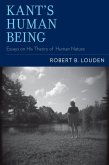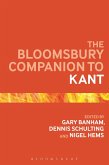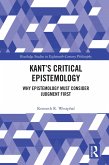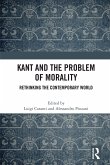Patricia Kitcher
Kant's Thinker (eBook, ePUB)
28,95 €
28,95 €
inkl. MwSt.
Sofort per Download lieferbar

14 °P sammeln
28,95 €
Als Download kaufen

28,95 €
inkl. MwSt.
Sofort per Download lieferbar

14 °P sammeln
Jetzt verschenken
Alle Infos zum eBook verschenken
28,95 €
inkl. MwSt.
Sofort per Download lieferbar
Alle Infos zum eBook verschenken

14 °P sammeln
Patricia Kitcher
Kant's Thinker (eBook, ePUB)
- Format: ePub
- Merkliste
- Auf die Merkliste
- Bewerten Bewerten
- Teilen
- Produkt teilen
- Produkterinnerung
- Produkterinnerung

Bitte loggen Sie sich zunächst in Ihr Kundenkonto ein oder registrieren Sie sich bei
bücher.de, um das eBook-Abo tolino select nutzen zu können.
Hier können Sie sich einloggen
Hier können Sie sich einloggen
Sie sind bereits eingeloggt. Klicken Sie auf 2. tolino select Abo, um fortzufahren.

Bitte loggen Sie sich zunächst in Ihr Kundenkonto ein oder registrieren Sie sich bei bücher.de, um das eBook-Abo tolino select nutzen zu können.
Kant's Thinker examines the Critique of Pure Reason 's account of the relation between cognition and self-consciousness. It shows how the theory that cognizers must understand their mental states as standing in relations of rational connection has implications for theories of the self-ascription of belief, consciousness and knowledge of other subjects.
- Geräte: eReader
- mit Kopierschutz
- eBook Hilfe
- Größe: 0.57MB
Andere Kunden interessierten sich auch für
![Kant's Human Being (eBook, ePUB) Kant's Human Being (eBook, ePUB)]() Robert B. LoudenKant's Human Being (eBook, ePUB)19,95 €
Robert B. LoudenKant's Human Being (eBook, ePUB)19,95 €![The Bloomsbury Companion to Kant (eBook, ePUB) The Bloomsbury Companion to Kant (eBook, ePUB)]() The Bloomsbury Companion to Kant (eBook, ePUB)31,95 €
The Bloomsbury Companion to Kant (eBook, ePUB)31,95 €![Kant on Freedom and Human Nature (eBook, ePUB) Kant on Freedom and Human Nature (eBook, ePUB)]() Kant on Freedom and Human Nature (eBook, ePUB)40,95 €
Kant on Freedom and Human Nature (eBook, ePUB)40,95 €![Kant's Critical Epistemology (eBook, ePUB) Kant's Critical Epistemology (eBook, ePUB)]() Kenneth R. WestphalKant's Critical Epistemology (eBook, ePUB)43,95 €
Kenneth R. WestphalKant's Critical Epistemology (eBook, ePUB)43,95 €![Die Zeit - Immanuel Kants transzendentale Ästhetik der Zeit und ihre Bedeutung für die neuzeitliche naturwissenschaftliche und philosophischen Debatte (eBook, ePUB) Die Zeit - Immanuel Kants transzendentale Ästhetik der Zeit und ihre Bedeutung für die neuzeitliche naturwissenschaftliche und philosophischen Debatte (eBook, ePUB)]() Martina MertenDie Zeit - Immanuel Kants transzendentale Ästhetik der Zeit und ihre Bedeutung für die neuzeitliche naturwissenschaftliche und philosophischen Debatte (eBook, ePUB)15,99 €
Martina MertenDie Zeit - Immanuel Kants transzendentale Ästhetik der Zeit und ihre Bedeutung für die neuzeitliche naturwissenschaftliche und philosophischen Debatte (eBook, ePUB)15,99 €![Kant and the Problem of Morality (eBook, ePUB) Kant and the Problem of Morality (eBook, ePUB)]() Kant and the Problem of Morality (eBook, ePUB)42,95 €
Kant and the Problem of Morality (eBook, ePUB)42,95 €![Toleration and Understanding in Locke (eBook, ePUB) Toleration and Understanding in Locke (eBook, ePUB)]() Nicholas JolleyToleration and Understanding in Locke (eBook, ePUB)27,95 €
Nicholas JolleyToleration and Understanding in Locke (eBook, ePUB)27,95 €-
-
-
Kant's Thinker examines the Critique of Pure Reason's account of the relation between cognition and self-consciousness. It shows how the theory that cognizers must understand their mental states as standing in relations of rational connection has implications for theories of the self-ascription of belief, consciousness and knowledge of other subjects.
Dieser Download kann aus rechtlichen Gründen nur mit Rechnungsadresse in A, B, BG, CY, CZ, D, DK, EW, E, FIN, F, GR, HR, H, IRL, I, LT, L, LR, M, NL, PL, P, R, S, SLO, SK ausgeliefert werden.
Produktdetails
- Produktdetails
- Verlag: OUP eBook
- Erscheinungstermin: 7. Januar 2011
- Englisch
- ISBN-13: 9780190208622
- Artikelnr.: 40806456
- Verlag: OUP eBook
- Erscheinungstermin: 7. Januar 2011
- Englisch
- ISBN-13: 9780190208622
- Artikelnr.: 40806456
- Herstellerkennzeichnung Die Herstellerinformationen sind derzeit nicht verfügbar.
Patricia Kitcher is Professor of Philosophy at Columbia University. She is the author of Kant's Transcendental Psychology.
* 1. Overview
* 1. Introduction
* 2. Interpretive Framework
* 3. Preview
* 4. Current Work on Kant's 'I-Think'
* Part I: Background
* 2. Locke's Internal Sense and Kant's Changing Views
* 1. Locke's Influence
* 2. Locke's Complex Theory of Internal Sense
* 3. Kant's Varied Reactions
* 4. 'Inner Sense' in relation to Kantian 'Apperception'
* 5. Kant's Use of 'Inner Sense'
* 3. Personal Identity and Its Problems
* 1. Locke's Problem
* 2. Leibniz's Criticisms and Additions
* 3. Kant and Hume
* 4. Tetens (and Hume)
* 4. Rationalist Metaphysics of Mind
* 1. The Role of Rationalism
* 2. Leibniz's Elegant 'I-theory'
* 3. Faculties, Powers and Substances
* 4. Rational Psychology
* 5. Consciousness, Self-Consciousness and Cognition
* 1. Introduction
* 2. Locke's 'Reflection' and Leibniz's 'Apperception'
* 3. Self-consciousness and Object cognition
* 4. Self-Consciousness through Self-Feeling
* 5. Summary
* 6. Strands of Argument in the Duisburg Nachla?
* 1. Introduction
* 2. Kant's Objection to the Inaugural Dissertation
* 3. Principles of Appearance and Thought in the Duisburg NachlaB
Notion of Apperception?
* 4. What is the Duisburg Nachla?'s Notion of 'Apperception?
* 5. From the Duisburg NachlaB to the Critique
* Part II: Theory
* 7. A Transcendental Deduction for A Priori Concepts
* 1. Kant's Goal
* 2. Clues to the Nature of the Argument
* 3. The First Premise of the Transcendental Deduction
* 4. Apriority and Activity
* 5. A 'Transcendental' Deduction
* 8. Synthesis: Why and How?
* 1. Problems to be Solved
* 2. Kant's Definition
* 3. Synthesis and Objective Reference
* 4. Five Syntheses and Their Relations
* 9. Arguing for Apperception
* 1. Introduction
* 2. 'I-Think' as the 'Cogito'; The One-step Deduction from Judgment
* 3. What Kind of Cognition Is at Issue in the Transcendental
Deduction?
* 4. What is the Principle of Apperception?
* 5. The Apperceptive Synthesis of Recognition in a Concept
* 6.Combination and Self-Consciousness in the B Deduction
* 7. Arguing from the Unity of Apperception to the Necessary
Applicability of Categories to Intuitions
* 8. Transcendental Apperception, Empirical Apperception and 'Mineness'
* 9. Summary
* 10. The Power of Apperception
* 1. Introduction
* 2. What is the Power/Faculty of Apperception?
* 3. Does the Faculty of Apperception Endure? Is it the 'Inner
Principle' of a Substance?
* 4. Does the Power of Apperception Initiate Causal Chains or Provide
Impressions of Necessary Connection?
* 5. 'Is it an Experience That I think?'
* 6. Root Powers, Scientific Ideals and the Ground of Appearances
* 11. 'I-Think' as the Destroyer of Rational Psychology
* 1. Understanding Kant's Criticisms
* 2. Kant's Earlier and Later Treatments of Rational Psychology
* 3. 'I-Think' as the Vehicle of the Categories
* 4. 'I-Think' as Analytically Contained in the Concept of Thought
* 5. Does the Analysis of Cognition Imply the Existence of a Thinker?
* 6. Why Can't Thinkers Know Themselves as Such?
* Part III: Evaluation
* 12. Is Kant's Theory Consistent?
* 1. The Old Objection
* 2. The Most Problematic Passage (A251-52)
* 3. The Confusion about the Causes of Sensations
* 4. A Second Look at the Most Problematic Passage
* 5. Criticizing Rationalist Confusions
* 6. What Kant's Epistemology and Metaphysics Imply
* 13. The Normativity Objection
* 1. Psychologism or Noumenalism?
* 2. Scrutinizing Sensations and Adding 'Transcendental Content'
* 3. Forming Concepts and Acquiring the I-Representation
* 4. Making A Priori Principles Explicit and Testing Instances
* 5. Normativity and the I-rule
* Appendix to Chapter 13: Longuenesse on Concept Formation
* 14. Is Kant's Thinker (as Such) a Free and Responsible Agent?
* 1. Introduction
* 2. Texts Linking Theoretical and Practical Reason
* 3. Autonomy and Accountability
* 4. Intellectual Accountability
* 15. Kant our Contemporary
* 1. Supporting and Showing Relevance
* 2. Transcendental Arguments
* 3. Must Rational Cognition involve Self-consciousness?
* 4. A Second Hard Problem of Consciousness?
* 5. Other 'I's
* 1. Introduction
* 2. Interpretive Framework
* 3. Preview
* 4. Current Work on Kant's 'I-Think'
* Part I: Background
* 2. Locke's Internal Sense and Kant's Changing Views
* 1. Locke's Influence
* 2. Locke's Complex Theory of Internal Sense
* 3. Kant's Varied Reactions
* 4. 'Inner Sense' in relation to Kantian 'Apperception'
* 5. Kant's Use of 'Inner Sense'
* 3. Personal Identity and Its Problems
* 1. Locke's Problem
* 2. Leibniz's Criticisms and Additions
* 3. Kant and Hume
* 4. Tetens (and Hume)
* 4. Rationalist Metaphysics of Mind
* 1. The Role of Rationalism
* 2. Leibniz's Elegant 'I-theory'
* 3. Faculties, Powers and Substances
* 4. Rational Psychology
* 5. Consciousness, Self-Consciousness and Cognition
* 1. Introduction
* 2. Locke's 'Reflection' and Leibniz's 'Apperception'
* 3. Self-consciousness and Object cognition
* 4. Self-Consciousness through Self-Feeling
* 5. Summary
* 6. Strands of Argument in the Duisburg Nachla?
* 1. Introduction
* 2. Kant's Objection to the Inaugural Dissertation
* 3. Principles of Appearance and Thought in the Duisburg NachlaB
Notion of Apperception?
* 4. What is the Duisburg Nachla?'s Notion of 'Apperception?
* 5. From the Duisburg NachlaB to the Critique
* Part II: Theory
* 7. A Transcendental Deduction for A Priori Concepts
* 1. Kant's Goal
* 2. Clues to the Nature of the Argument
* 3. The First Premise of the Transcendental Deduction
* 4. Apriority and Activity
* 5. A 'Transcendental' Deduction
* 8. Synthesis: Why and How?
* 1. Problems to be Solved
* 2. Kant's Definition
* 3. Synthesis and Objective Reference
* 4. Five Syntheses and Their Relations
* 9. Arguing for Apperception
* 1. Introduction
* 2. 'I-Think' as the 'Cogito'; The One-step Deduction from Judgment
* 3. What Kind of Cognition Is at Issue in the Transcendental
Deduction?
* 4. What is the Principle of Apperception?
* 5. The Apperceptive Synthesis of Recognition in a Concept
* 6.Combination and Self-Consciousness in the B Deduction
* 7. Arguing from the Unity of Apperception to the Necessary
Applicability of Categories to Intuitions
* 8. Transcendental Apperception, Empirical Apperception and 'Mineness'
* 9. Summary
* 10. The Power of Apperception
* 1. Introduction
* 2. What is the Power/Faculty of Apperception?
* 3. Does the Faculty of Apperception Endure? Is it the 'Inner
Principle' of a Substance?
* 4. Does the Power of Apperception Initiate Causal Chains or Provide
Impressions of Necessary Connection?
* 5. 'Is it an Experience That I think?'
* 6. Root Powers, Scientific Ideals and the Ground of Appearances
* 11. 'I-Think' as the Destroyer of Rational Psychology
* 1. Understanding Kant's Criticisms
* 2. Kant's Earlier and Later Treatments of Rational Psychology
* 3. 'I-Think' as the Vehicle of the Categories
* 4. 'I-Think' as Analytically Contained in the Concept of Thought
* 5. Does the Analysis of Cognition Imply the Existence of a Thinker?
* 6. Why Can't Thinkers Know Themselves as Such?
* Part III: Evaluation
* 12. Is Kant's Theory Consistent?
* 1. The Old Objection
* 2. The Most Problematic Passage (A251-52)
* 3. The Confusion about the Causes of Sensations
* 4. A Second Look at the Most Problematic Passage
* 5. Criticizing Rationalist Confusions
* 6. What Kant's Epistemology and Metaphysics Imply
* 13. The Normativity Objection
* 1. Psychologism or Noumenalism?
* 2. Scrutinizing Sensations and Adding 'Transcendental Content'
* 3. Forming Concepts and Acquiring the I-Representation
* 4. Making A Priori Principles Explicit and Testing Instances
* 5. Normativity and the I-rule
* Appendix to Chapter 13: Longuenesse on Concept Formation
* 14. Is Kant's Thinker (as Such) a Free and Responsible Agent?
* 1. Introduction
* 2. Texts Linking Theoretical and Practical Reason
* 3. Autonomy and Accountability
* 4. Intellectual Accountability
* 15. Kant our Contemporary
* 1. Supporting and Showing Relevance
* 2. Transcendental Arguments
* 3. Must Rational Cognition involve Self-consciousness?
* 4. A Second Hard Problem of Consciousness?
* 5. Other 'I's
* 1. Overview
* 1. Introduction
* 2. Interpretive Framework
* 3. Preview
* 4. Current Work on Kant's 'I-Think'
* Part I: Background
* 2. Locke's Internal Sense and Kant's Changing Views
* 1. Locke's Influence
* 2. Locke's Complex Theory of Internal Sense
* 3. Kant's Varied Reactions
* 4. 'Inner Sense' in relation to Kantian 'Apperception'
* 5. Kant's Use of 'Inner Sense'
* 3. Personal Identity and Its Problems
* 1. Locke's Problem
* 2. Leibniz's Criticisms and Additions
* 3. Kant and Hume
* 4. Tetens (and Hume)
* 4. Rationalist Metaphysics of Mind
* 1. The Role of Rationalism
* 2. Leibniz's Elegant 'I-theory'
* 3. Faculties, Powers and Substances
* 4. Rational Psychology
* 5. Consciousness, Self-Consciousness and Cognition
* 1. Introduction
* 2. Locke's 'Reflection' and Leibniz's 'Apperception'
* 3. Self-consciousness and Object cognition
* 4. Self-Consciousness through Self-Feeling
* 5. Summary
* 6. Strands of Argument in the Duisburg Nachla?
* 1. Introduction
* 2. Kant's Objection to the Inaugural Dissertation
* 3. Principles of Appearance and Thought in the Duisburg NachlaB
Notion of Apperception?
* 4. What is the Duisburg Nachla?'s Notion of 'Apperception?
* 5. From the Duisburg NachlaB to the Critique
* Part II: Theory
* 7. A Transcendental Deduction for A Priori Concepts
* 1. Kant's Goal
* 2. Clues to the Nature of the Argument
* 3. The First Premise of the Transcendental Deduction
* 4. Apriority and Activity
* 5. A 'Transcendental' Deduction
* 8. Synthesis: Why and How?
* 1. Problems to be Solved
* 2. Kant's Definition
* 3. Synthesis and Objective Reference
* 4. Five Syntheses and Their Relations
* 9. Arguing for Apperception
* 1. Introduction
* 2. 'I-Think' as the 'Cogito'; The One-step Deduction from Judgment
* 3. What Kind of Cognition Is at Issue in the Transcendental
Deduction?
* 4. What is the Principle of Apperception?
* 5. The Apperceptive Synthesis of Recognition in a Concept
* 6.Combination and Self-Consciousness in the B Deduction
* 7. Arguing from the Unity of Apperception to the Necessary
Applicability of Categories to Intuitions
* 8. Transcendental Apperception, Empirical Apperception and 'Mineness'
* 9. Summary
* 10. The Power of Apperception
* 1. Introduction
* 2. What is the Power/Faculty of Apperception?
* 3. Does the Faculty of Apperception Endure? Is it the 'Inner
Principle' of a Substance?
* 4. Does the Power of Apperception Initiate Causal Chains or Provide
Impressions of Necessary Connection?
* 5. 'Is it an Experience That I think?'
* 6. Root Powers, Scientific Ideals and the Ground of Appearances
* 11. 'I-Think' as the Destroyer of Rational Psychology
* 1. Understanding Kant's Criticisms
* 2. Kant's Earlier and Later Treatments of Rational Psychology
* 3. 'I-Think' as the Vehicle of the Categories
* 4. 'I-Think' as Analytically Contained in the Concept of Thought
* 5. Does the Analysis of Cognition Imply the Existence of a Thinker?
* 6. Why Can't Thinkers Know Themselves as Such?
* Part III: Evaluation
* 12. Is Kant's Theory Consistent?
* 1. The Old Objection
* 2. The Most Problematic Passage (A251-52)
* 3. The Confusion about the Causes of Sensations
* 4. A Second Look at the Most Problematic Passage
* 5. Criticizing Rationalist Confusions
* 6. What Kant's Epistemology and Metaphysics Imply
* 13. The Normativity Objection
* 1. Psychologism or Noumenalism?
* 2. Scrutinizing Sensations and Adding 'Transcendental Content'
* 3. Forming Concepts and Acquiring the I-Representation
* 4. Making A Priori Principles Explicit and Testing Instances
* 5. Normativity and the I-rule
* Appendix to Chapter 13: Longuenesse on Concept Formation
* 14. Is Kant's Thinker (as Such) a Free and Responsible Agent?
* 1. Introduction
* 2. Texts Linking Theoretical and Practical Reason
* 3. Autonomy and Accountability
* 4. Intellectual Accountability
* 15. Kant our Contemporary
* 1. Supporting and Showing Relevance
* 2. Transcendental Arguments
* 3. Must Rational Cognition involve Self-consciousness?
* 4. A Second Hard Problem of Consciousness?
* 5. Other 'I's
* 1. Introduction
* 2. Interpretive Framework
* 3. Preview
* 4. Current Work on Kant's 'I-Think'
* Part I: Background
* 2. Locke's Internal Sense and Kant's Changing Views
* 1. Locke's Influence
* 2. Locke's Complex Theory of Internal Sense
* 3. Kant's Varied Reactions
* 4. 'Inner Sense' in relation to Kantian 'Apperception'
* 5. Kant's Use of 'Inner Sense'
* 3. Personal Identity and Its Problems
* 1. Locke's Problem
* 2. Leibniz's Criticisms and Additions
* 3. Kant and Hume
* 4. Tetens (and Hume)
* 4. Rationalist Metaphysics of Mind
* 1. The Role of Rationalism
* 2. Leibniz's Elegant 'I-theory'
* 3. Faculties, Powers and Substances
* 4. Rational Psychology
* 5. Consciousness, Self-Consciousness and Cognition
* 1. Introduction
* 2. Locke's 'Reflection' and Leibniz's 'Apperception'
* 3. Self-consciousness and Object cognition
* 4. Self-Consciousness through Self-Feeling
* 5. Summary
* 6. Strands of Argument in the Duisburg Nachla?
* 1. Introduction
* 2. Kant's Objection to the Inaugural Dissertation
* 3. Principles of Appearance and Thought in the Duisburg NachlaB
Notion of Apperception?
* 4. What is the Duisburg Nachla?'s Notion of 'Apperception?
* 5. From the Duisburg NachlaB to the Critique
* Part II: Theory
* 7. A Transcendental Deduction for A Priori Concepts
* 1. Kant's Goal
* 2. Clues to the Nature of the Argument
* 3. The First Premise of the Transcendental Deduction
* 4. Apriority and Activity
* 5. A 'Transcendental' Deduction
* 8. Synthesis: Why and How?
* 1. Problems to be Solved
* 2. Kant's Definition
* 3. Synthesis and Objective Reference
* 4. Five Syntheses and Their Relations
* 9. Arguing for Apperception
* 1. Introduction
* 2. 'I-Think' as the 'Cogito'; The One-step Deduction from Judgment
* 3. What Kind of Cognition Is at Issue in the Transcendental
Deduction?
* 4. What is the Principle of Apperception?
* 5. The Apperceptive Synthesis of Recognition in a Concept
* 6.Combination and Self-Consciousness in the B Deduction
* 7. Arguing from the Unity of Apperception to the Necessary
Applicability of Categories to Intuitions
* 8. Transcendental Apperception, Empirical Apperception and 'Mineness'
* 9. Summary
* 10. The Power of Apperception
* 1. Introduction
* 2. What is the Power/Faculty of Apperception?
* 3. Does the Faculty of Apperception Endure? Is it the 'Inner
Principle' of a Substance?
* 4. Does the Power of Apperception Initiate Causal Chains or Provide
Impressions of Necessary Connection?
* 5. 'Is it an Experience That I think?'
* 6. Root Powers, Scientific Ideals and the Ground of Appearances
* 11. 'I-Think' as the Destroyer of Rational Psychology
* 1. Understanding Kant's Criticisms
* 2. Kant's Earlier and Later Treatments of Rational Psychology
* 3. 'I-Think' as the Vehicle of the Categories
* 4. 'I-Think' as Analytically Contained in the Concept of Thought
* 5. Does the Analysis of Cognition Imply the Existence of a Thinker?
* 6. Why Can't Thinkers Know Themselves as Such?
* Part III: Evaluation
* 12. Is Kant's Theory Consistent?
* 1. The Old Objection
* 2. The Most Problematic Passage (A251-52)
* 3. The Confusion about the Causes of Sensations
* 4. A Second Look at the Most Problematic Passage
* 5. Criticizing Rationalist Confusions
* 6. What Kant's Epistemology and Metaphysics Imply
* 13. The Normativity Objection
* 1. Psychologism or Noumenalism?
* 2. Scrutinizing Sensations and Adding 'Transcendental Content'
* 3. Forming Concepts and Acquiring the I-Representation
* 4. Making A Priori Principles Explicit and Testing Instances
* 5. Normativity and the I-rule
* Appendix to Chapter 13: Longuenesse on Concept Formation
* 14. Is Kant's Thinker (as Such) a Free and Responsible Agent?
* 1. Introduction
* 2. Texts Linking Theoretical and Practical Reason
* 3. Autonomy and Accountability
* 4. Intellectual Accountability
* 15. Kant our Contemporary
* 1. Supporting and Showing Relevance
* 2. Transcendental Arguments
* 3. Must Rational Cognition involve Self-consciousness?
* 4. A Second Hard Problem of Consciousness?
* 5. Other 'I's







